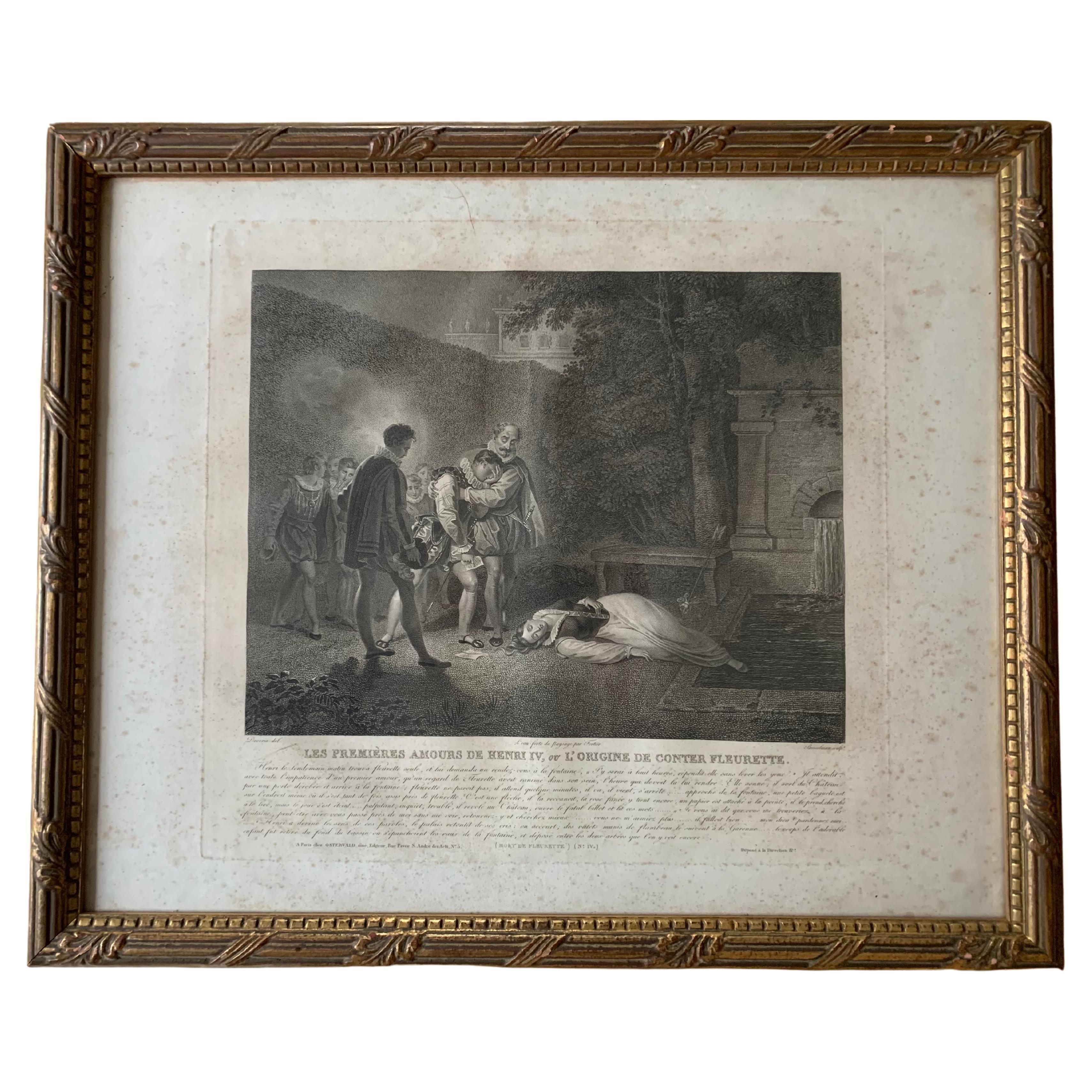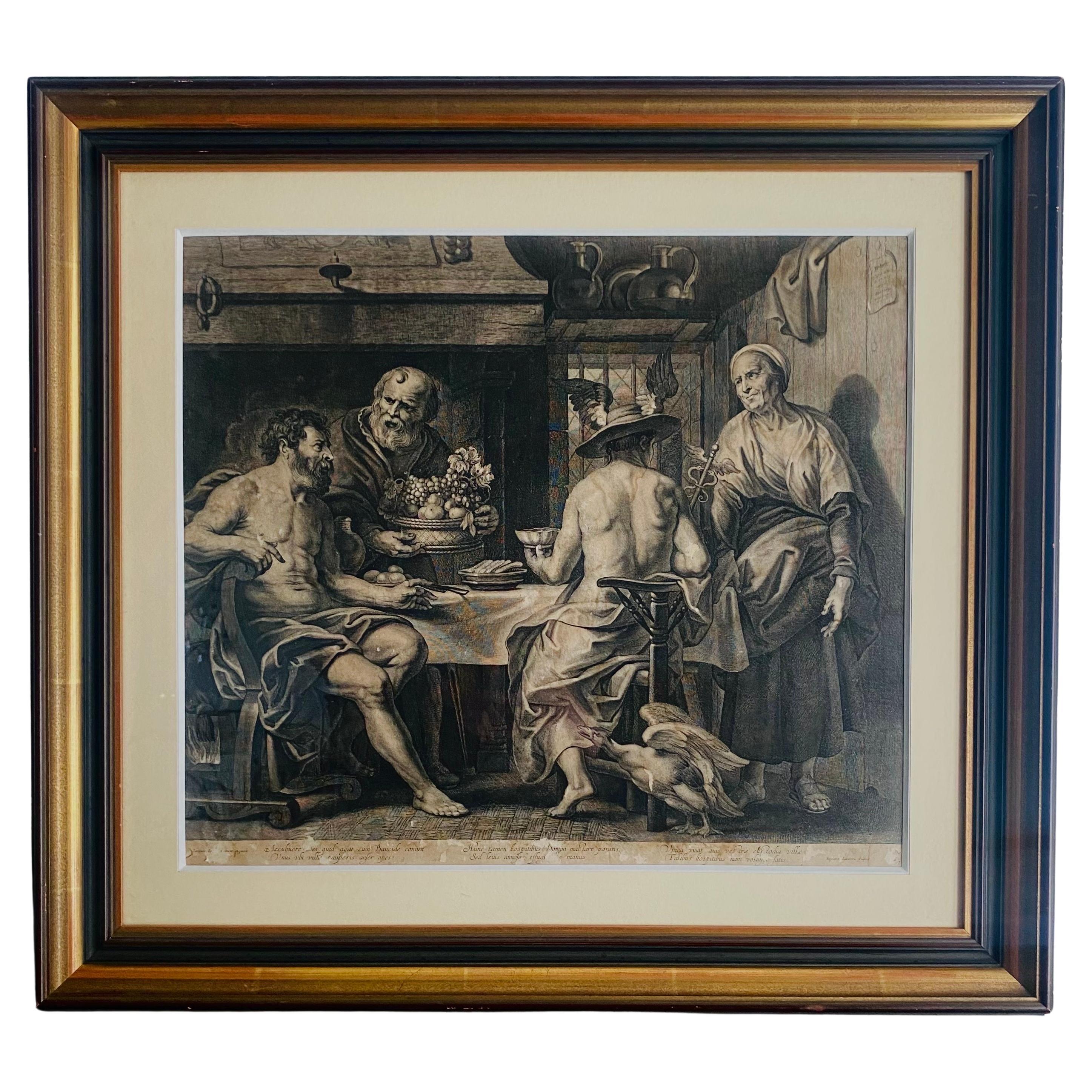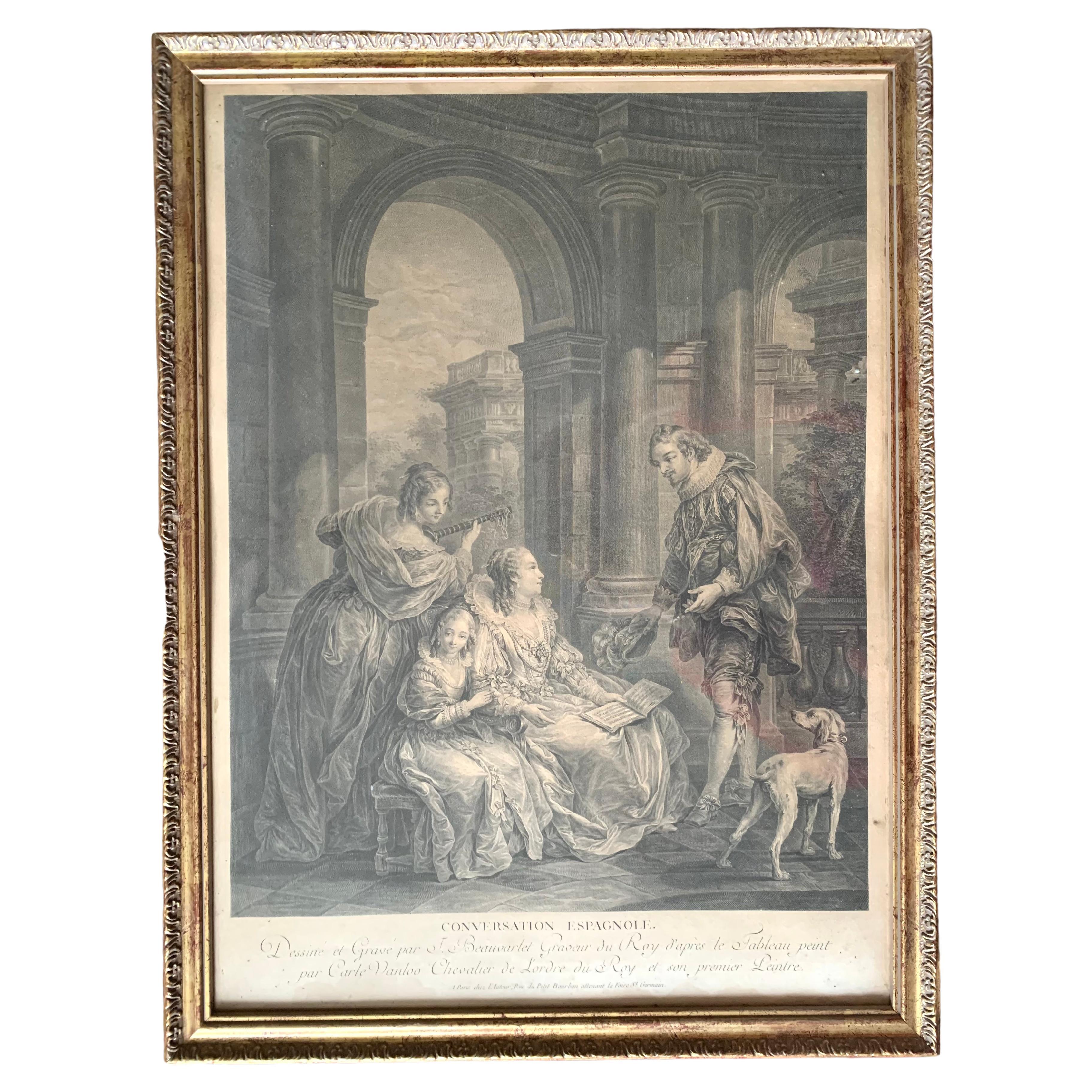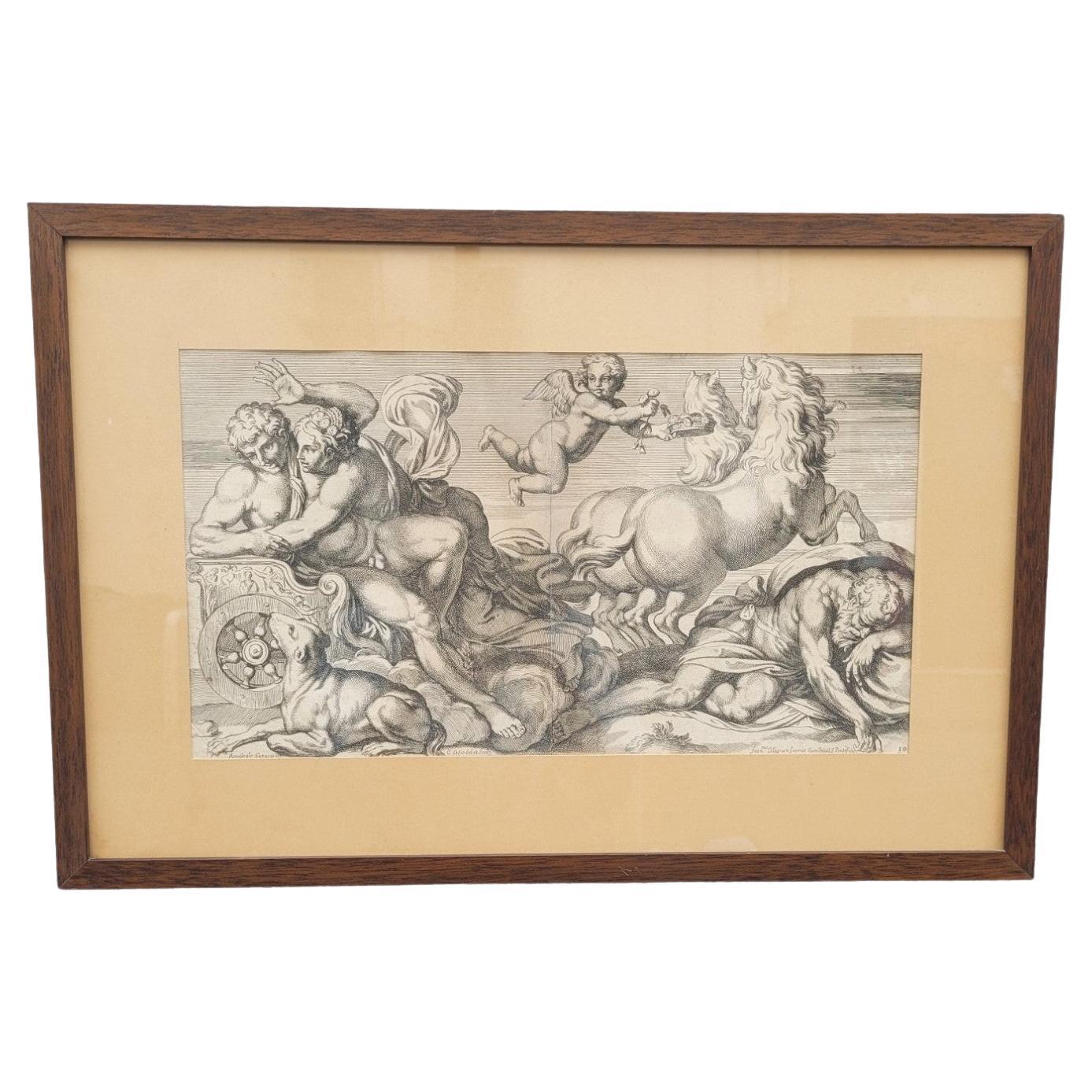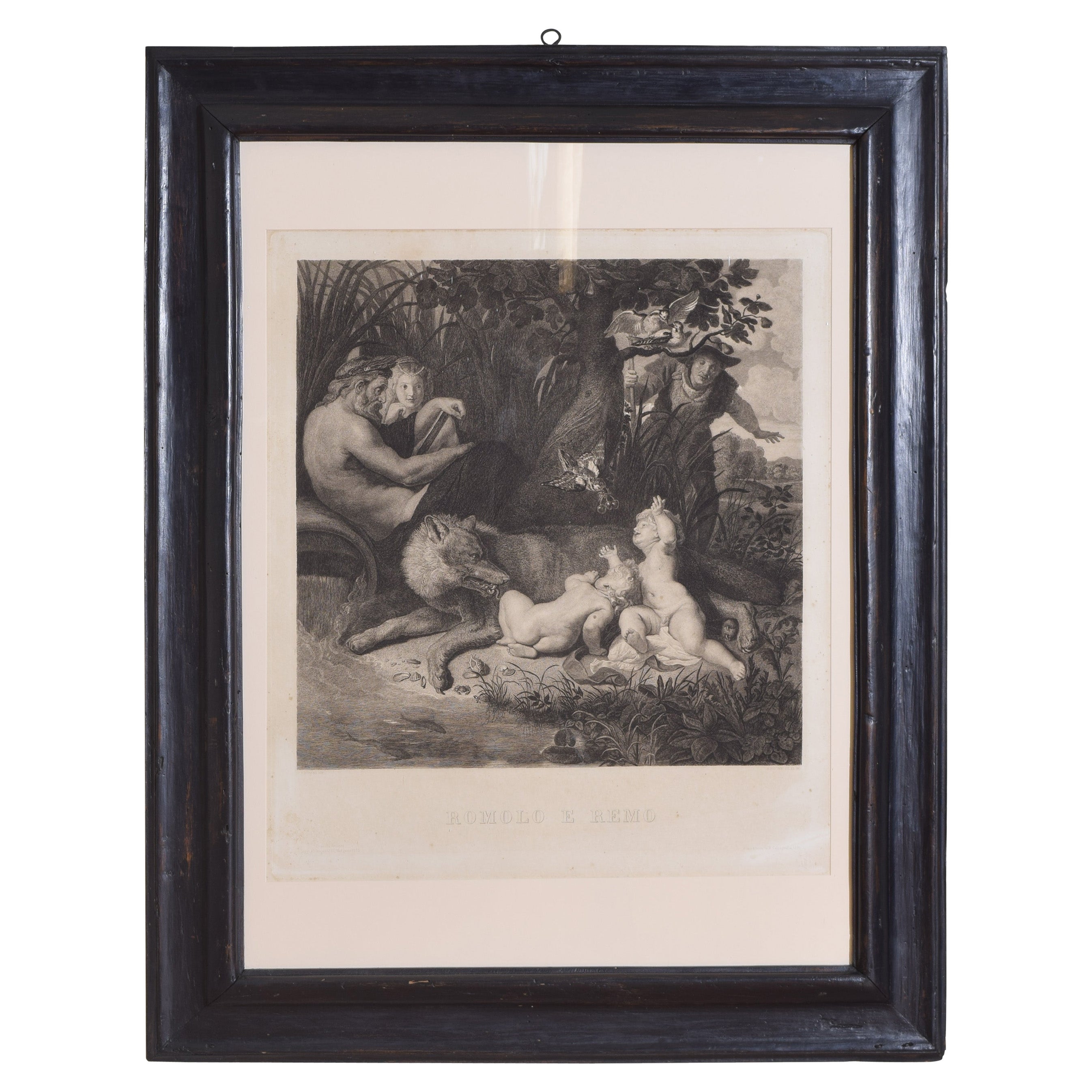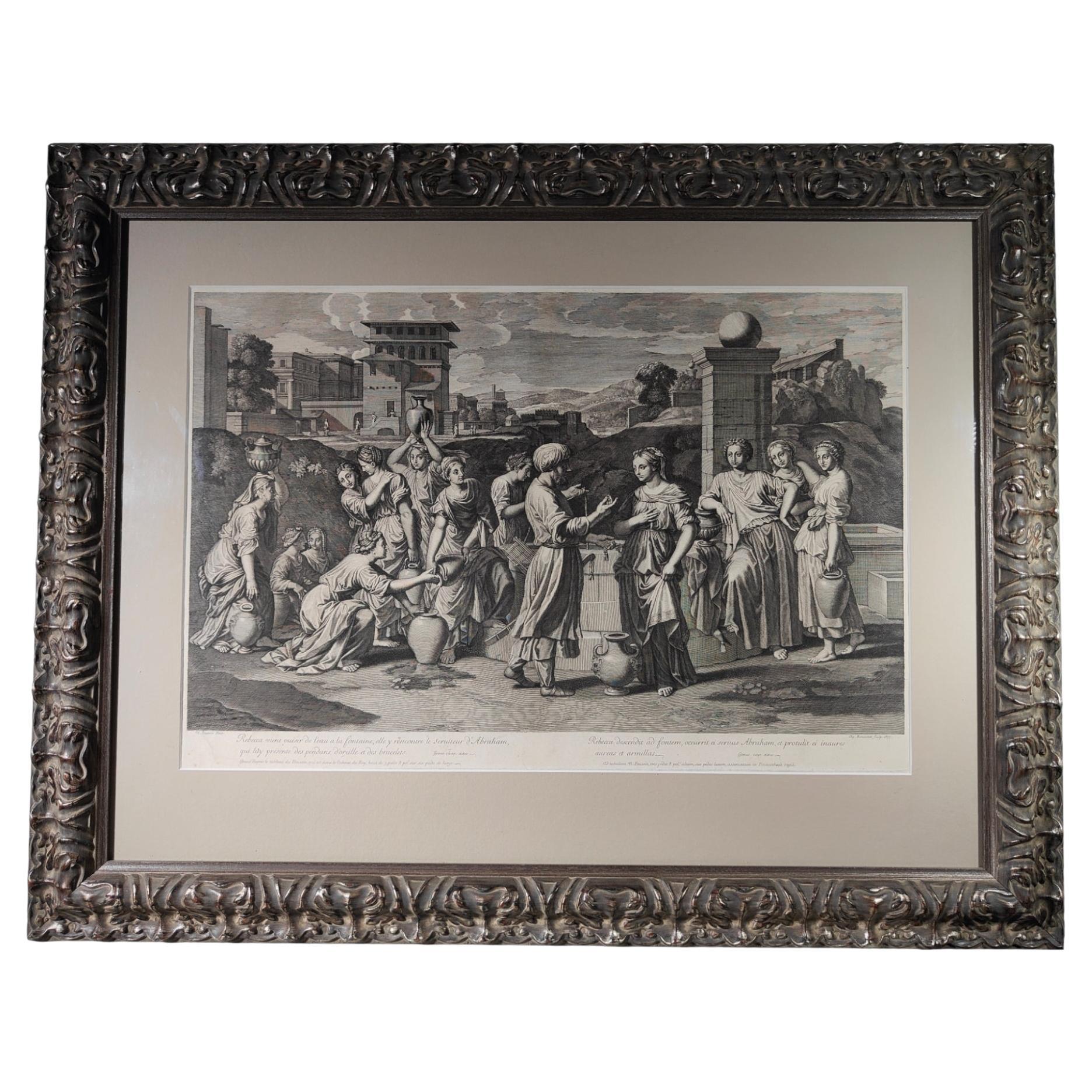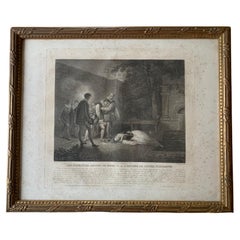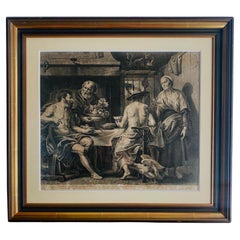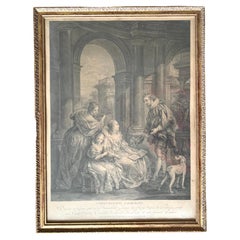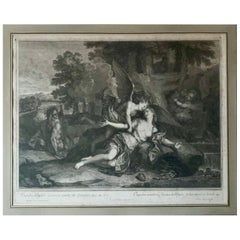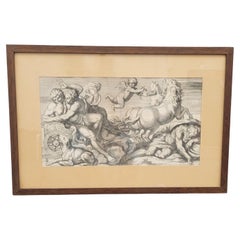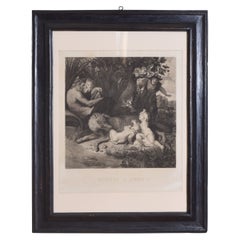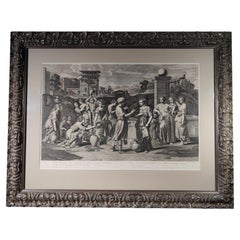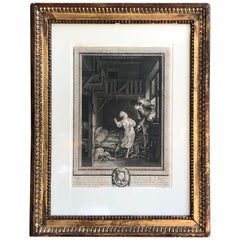Items Similar to Pierre Paul Rubens « Silène’s Walk », Engraving 18th Century
Want more images or videos?
Request additional images or videos from the seller
1 of 12
Pierre Paul Rubens « Silène’s Walk », Engraving 18th Century
$1,067.07
£794.58
€900
CA$1,466.22
A$1,640.98
CHF 856.46
MX$20,011.44
NOK 10,961.56
SEK 10,376.52
DKK 6,850.91
Shipping
Retrieving quote...The 1stDibs Promise:
Authenticity Guarantee,
Money-Back Guarantee,
24-Hour Cancellation
About the Item
Beautiful engraving made by Nicolas de Launay after the work of Peter Paul Rubens.This engraving represents a bacchanalian scene featuring Silenus a mythological character.
In this scene Silenus is in the center, intoxicated by wine. He is held by two satyrs, mythological characters known for their excessiveness and their pleasure in getting drunk him with wine. Above Silenus is the nymph Egee who is squeezing blackberry juice in her hands. To the right of the composition is a character playing the flute. On the left is another satyr who is intoxicating a villager, in view of the presence of a goat in the lower left corner. This shepherd has an empty carafe in his hand. In this lower left corner there are also two children holding vines in their hands.
Peter Paul Rubens is a very important Flemish painter of the 17th century. He produced works of great diversity (genre scenes, portraits, historical scenes, religious scenes etc.) His painting is characterized by the little attention he pays to detail, but also by the few strokes forming the drawing. But he pays great attention to the color and movement in these compositions giving a great realism to the whole.
Nicolas de Launay is a French engraver of the XVIIIth century.He enters very quickly the academy of Copenhagen thanks to his great talent. He also became the king's engraver. He is characterized by the great multitudes of subjects in his engravings (reproduction of great masters, portraits, vignettes). One of his major works is the one described above, the March of Silenus after the work of Rubens.
Frame Dimensions :
W: 24,2 Inch
H : 20,9 Inch.
- Dimensions:Height: 17.92 in (45.5 cm)Width: 21.07 in (53.5 cm)Depth: 0.79 in (2 cm)
- Materials and Techniques:
- Place of Origin:
- Period:
- Date of Manufacture:1740
- Condition:Lack on the frame.
- Seller Location:Beuzevillette, FR
- Reference Number:1stDibs: LU2663327191812
About the Seller
4.9
Vetted Professional Seller
Every seller passes strict standards for authenticity and reliability
Established in 2010
1stDibs seller since 2017
298 sales on 1stDibs
Typical response time: 6 hours
- ShippingRetrieving quote...Shipping from: Nointot, France
- Return Policy
Authenticity Guarantee
In the unlikely event there’s an issue with an item’s authenticity, contact us within 1 year for a full refund. DetailsMoney-Back Guarantee
If your item is not as described, is damaged in transit, or does not arrive, contact us within 7 days for a full refund. Details24-Hour Cancellation
You have a 24-hour grace period in which to reconsider your purchase, with no questions asked.Vetted Professional Sellers
Our world-class sellers must adhere to strict standards for service and quality, maintaining the integrity of our listings.Price-Match Guarantee
If you find that a seller listed the same item for a lower price elsewhere, we’ll match it.Trusted Global Delivery
Our best-in-class carrier network provides specialized shipping options worldwide, including custom delivery.More From This Seller
View AllAlexandre Joseph Desenne "the First Loves of Henri iv" Engraving, 19th Century
Located in Beuzevillette, FR
This splendid engraving is part of a series of 4 engravings. These différent engravings are entitled : « The archery », « the rendezvous at the fountain », « the infidelity » and fin...
Category
Antique Early 19th Century French Picture Frames
Materials
Paper
LAUWERS 17th Etching Engraving Jupiter & Mercury & Zeus Hermes JORDAENS - Framed
By Jacob Jordaens
Located in Beuzevillette, FR
Large and beautiful etching, engraving by Nicolaes Lauwers after Jacob Jordaens.
Flanders, 17th century.
Representing Zeus and Hermes (Jupiter and Mercury) in the house of Philemon a...
Category
Antique 17th Century Belgian Louis XIV Prints
Materials
Paper
Carle Van Loo " Spanish Conversation and Reading " Engraving 18th Century
Located in Beuzevillette, FR
Charming pair of engravings representing gallant scenes engraved by Jacques Firmin Beauvarlet after the works of Carle Van Loo. These two works are entit...
Category
Antique 18th Century French Picture Frames
Materials
Paper
Antoine Coypel Engraving "Amor and Psyche" by Jean Audran, 18th Century
By Charles Coypel
Located in Beuzevillette, FR
This beautiful engraving of "Cupido and Psyche" by Jean Audran after a work by Antoine Coypel.
Inspired directly by Greek mythology. Psyche is a young ...
Category
Antique Early 18th Century French Louis XIV Prints
Materials
Paper
Nicolas Lancret « Gallant Conversation » Engraving 19th Century
By Nicolas Lancret 1
Located in Beuzevillette, FR
This charming engraving is the work of Jacques Philippe, after the one by Nicolas Lancret. This work is the one that was used for the reception of LeBa...
Category
Antique Late 18th Century French Picture Frames
Materials
Paper
"La tentation de Saint Antoine" Engraving 17th according to Jacques Callot
By Jacques Callot
Located in Beuzevillette, FR
The Temptation of Saint Anthony inspired by Jacques Callot. The engraving is almost identical to the one made by Jacques Callot. The detail...
Category
Antique 17th Century French Picture Frames
Materials
Paper
You May Also Like
Aurora And Cephale, Framed Engraving, Carracci, 17th Century?
By Annibale Carracci
Located in MARSEILLE, FR
The framed engraving of "Aurore and Cephalus" depicts the kidnapping of Prince Cephalus by Aurore, who has fallen madly in love with him.
This work was created by Annibale Carracci ...
Category
Antique 17th Century Italian Baroque Prints
Materials
Paper
Italian Large Engraving of Romulus & Remus, Ebonized Frame, 2nd Half 19th Cen
Located in Atlanta, GA
In Roman mythology, Romulus and Remus are twin brothers whose story tells of the events that led to the founding of the city of Rome and the Roman Kingdom by Romulus, following his f...
Category
Antique 19th Century Italian Prints
Materials
Paper
Old Engraving from the xvii Century: Nicolas Paussin, 1677
Located in Madrid, ES
Old engraving from the 17th century: Nicolas Paussin 1677
Large seventeenth century engraving dated 1677. With very decorative back frame total measures: 91x71 cm and only the engra...
Category
Antique 17th Century Drawings
Materials
Paper
18th Century French Print by Pierre Philippe Choffard
Located in Doylestown, PA
A late 18th century French engraving titled “Marche tout doux, parlez tout bas” (Walk very softly, speak very low) by Pierre Philippe Cho...
Category
Antique Late 18th Century French Louis XVI Prints
Materials
Paper
$850 Sale Price
41% Off
18t Century Engraving "The Triumph De Ceres"
Located in Houston, TX
The Triumph of Ceres engraving by Louis Crepy after Jean-Antoine Watteau. Has Watteau inscription on bottom left and Crepy inscription on the right. An early 1700's French engraving ...
Category
Antique Early 18th Century French Other Prints
Materials
Paper
17th Century Pair of Etchings by Theodoor Van Thunlden from Rubens, Antwerp 1642
By Theodoor van Thulden, Peter Paul Rubens
Located in Cagliari, IT
"Arch dedicated to Hercules" and "Arch dedicated to Bellerophon"
Splendid and very rare etchings belonging to a suite of subjects executed for the preparations of the "Celebrations for the entry into Antwerp of the Cardinal-Infante Ferdinando of Habsburg-Spain on 17 April 1635".
The sketches for the decorations were all drawn by Sir Peter Paul Rubens and the execution of the etchings was entrusted to Van Thulden.
Bottom left: P.P. Rubens. Bottom right: G. Gervatius (who was commissioned to bring together the illustrations of the arches in a special volume) and Van Thulden.
Laid paper with watermark - copper imprint - margins - excellent condition.
At the end of 1634 Peter Paul Rubens (1577-1640) was invited to make a series of drawings to decorate the city of Antwerp on the occasion of the solemn entry of the infant cardinal Ferdinand of Habsburg (1609-1641) who, after his death of Archduchess Isabella Clara Eugenia (1633), Spanish governor of the southern Netherlands, had been elected as his successor. Generally in these circumstances, the itinerary was articulated through a series of stations and the city - in its main urban hubs - was adorned with decorations and ephemeral apparatuses which, without solution of continuity, covered the facades of the palaces, churches and convents facing the parade axis of the celebratory itinerary, testifying to the participatory role of the various public and private institutions that took part in the feast1. As had happened for the entrances of Charles V in 1520, of Philip II in 1549 and of the archdukes Albert and Isabella in 1599, also in this case, on 17 April 1635, the most important streets and squares of Antwerp were enriched with arrangements: temporary altars, four scenarios, a portico and large triumphal arches built in wood, over twenty meters height, decorated with paintings, sculptures and allegorical scenes. The references to the ancient alluded in this case to the greatness of the Habsburgs and to the merits of Ferdinand for the victory obtained over the Protestant armies of Sweden and their German allies. The choice to use the triumphal arch has its roots in the "city of the popes" and must be read as a connection with the triumphal and modern arches, with Rome and with the "possession" ceremony, placing the emphasis on its centuries-old use . In the elaboration of the drawings and sketches Rubens proved to be a true connoisseur of architecture, but what is most surprising about the artist is the casual use of architectural language and fidelity to sixteenth-century Roman models. In order for the memory of these works to be perpetuated over time, some artists were commissioned to etch the ephemeral apparatuses and, under the guidance of the painter Theodor van Thulden...
Category
Antique 17th Century Belgian Baroque Prints
Materials
Paper
$2,845 Sale Price
20% Off
More Ways To Browse
Used Frames For Paintings
18th Century French Engraving
Plays The Flute
18th Century Reproduction
18th Century Reproduction Furniture
French Academy Drawing
Wine Carafe
Flemish Frame 17th
Satyr And Nymph
French Wine Carafe
Antique Wine Carafe
Antique Hand Carved Picture Frames
Carved Gold Picture Frame
Antique Silk Picture
French Gilt Photo Frames
Enamel Photo Frames
Lacquer Frame Picture
Antique Gilded Picture Frames
